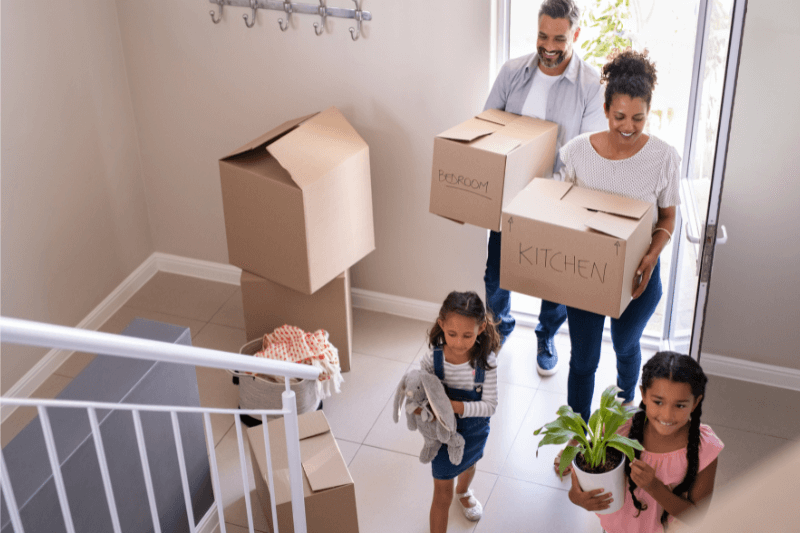
Prefer not to leave your phone number?
No problem!
Schedule an Appointment at your Convenience
(Only email is required)
Schedule an AppointmentOr Call Now
844-545-1881By: Last Updated: Jan 01, 2025
This is the only guide you’ll ever need to set up utilities in your new home. We’ll go over everything you need to know, what to watch out for, and our personal recommendations.

I don’t know about you, but utilities are scary! Figuring out how to set up electricity, water, gas, and the internet is complicated and confusing at first glance.
But that’s why we’ve created this article to turn utilities into a stress-free, easy process, just-for-you.
Create a detailed list of the utilities you’ll need in your new home. This list will vary depending on your location, whether you rent or own your home, and your lease agreement.
Here’s a sample list:
Give at least 3-4 weeks before moving day to contact your current utility companies. Provide each company with your new address to ensure you receive your final bill.
1-2 weeks before your move-in date, schedule the setup or transfer of utilities for your new residence.
If you’re not certain who to contact, you can always talk to your real estate agent or landlord for help. Some utility companies may require a deposit, while others may charge a startup, activation, or service fee.
When it comes to electric and gas utilities, you’re typically faced with two choices: a regulated market or a deregulated market.
Regulated markets offer a single utility provider, while deregulated markets offer multiple providers. In deregulated markets, utilities like gas and electricity come from private companies, meaning there’s more competition, leading to more choices and lower costs.
Try to plan at least 2 weeks in advance to set up your electricity and gas. Schedule the lights and gas to be switched over to you on the day after your lease starts. Having power and gas while moving in is a must. Many providers require a deposit of $100 or more to start service, especially if you’re a first-time customer.
Check with your local utility commission or search online to determine which market type you are.
When you move into a new home, you will need to set up an account with a new water supplier or use your existing one. Your water usage bill is calculated by the number of gallons of water you consume in a month, including taking a shower, washing the dishes, and drinking water (if by tap).
Ask the previous owners, your new neighbors, or your realtor about the water provider for your new property, or just simply search it online.
The water supplier may bundle your water bill with a sewer bill, depending on whether your home has a septic tank. Also, you won’t need to be present when the water is turned on; this will be handled on your initial phone call.
It’s best to research at least 3 internet and satellite TV providers in your area to compare quotes. Many companies offer discounts and promotions for new customers. Make sure to set up at least a week in advance to ensure proper connection on move-in day.
There are many different security providers to choose from, so here are a few aspects to keep in mind.
Look for providers that match your personal preferences, have the best deal, and make you feel the safest. A few things to look for on the budget side is installation fees, monitoring fees, and equipment costs. Give your provider a call and set up a time for them to install the system in your home.
If you still use a landline phone, you’ll need to set up a service with a provider. These can be found with a quick Google search.
This is a high-tech implementation that can be done in your home to control the features with a remote or by phone.
If you live in a sunny state, you might want to consider opting for solar power because the rates don’t change as often as normal electricity. There are countless providers to choose from, so compare quotes to get the best deal.
Setting up all the different utilities in your new home may be complicated, but it’s definitely worth it in the long run. Make your list and check them off as you go to stay organized. We’ve laid out how to contact your providers or how to get the best recommendations.
Remember to compare prices to ensure you’re not getting ripped off by your providers.
Alright! Now that you’ve got all your utilities covered, it’s time to settle in and enjoy your new place.
Electricity, water, gas, internet, and cable. You might also need trash and recycling and security systems.
To choose the best utility providers in your area ask for recommendations from friends and family, neighbors, your realtor, etc. A quick Google search will provide some great results too.
Review your bill for rate structure, monthly usage, and any additional or hidden fees. For electricity, understand how to read your meter. For water, check for leaks if you have unnecessarily high bills.
Prepare a list of utilities and research providers in the area. Compare deals/promotions and quotes. Prepare your house for any installations or walkthroughs.